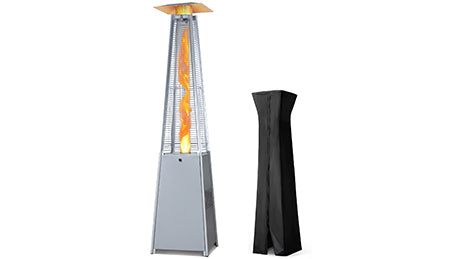Hanging out on a deck, patio, or garden with your friends and loved ones is the best way to spend time with them. Many people use propane heater tank on their decks to lengthen the time they can spend outside.
By transferring the indoor environment to your outdoor living spaces, these heaters provide instant warmth and ambiance in your house.
It's feasible to spend extended hours on your patio with a propane-fueled heater, especially during the year's cooler months. If you're considering buying a patio heater, you probably have one question: how long does a patio heater tank last? Here's everything you need to know:
Propane tanks are exceptionally tough, designed to properly hold liquid propane gas under pressure while also standing up to the elements and extreme weather. However, even the most rigid tank has a shelf life and must be inspected and reviewed regularly.
How Long does the Patio Heater Tank Last?
A tank is suitable for 12 years from manufacturing in the United States but only ten years in Canada. Depending on recertification, a recertified tank is ideal for 5, 7, or 12 years.
Large patio propane tanks must be recertified ten years after their manufacture date and then every five years.
A quick maintenance checklist is as follows:
- Examine your underground tank's anti-corrosion coating.
- Examine the appliance's connections.
- Examine the vents on your devices.
- Testing for leaks
- Monitoring of fuel purity
- When your fuel tank isn't in use, make sure it's disconnected.
- Make sure your propane tank is constantly level with the ground.
How can you Make Your Patio Heater Tank Last Longer?
After you've checked the security elements of your patio heater and picked one, there are a couple of things to make your patio heater tank last longer.
The Secure Position
Patio Tank isn’t intended to transmit intense hotness over significant times; all things considered. If your heater is placed near specific materials, it can give a fire danger.
These heater tank ought to be avoided as flammable things. It incorporates flammable materials like fuel tanks for grills or lighter liquid, open-air cloths, and grass.
The suggested distance between combustibles and you are around three feet. It will keep specific flammable items and synthetic compounds from being presented to outrageous hotness. Notwithstanding, because your patio heater tank might have extra elements or constructions that require substitute establishment, consistently check the producer's rules in the guidance booklet for your particular model.
Safe Environment
Patio tank ought to be utilized outside, and the mind ought to be made to guarantee that your radiator has sufficient leeway and is in a protected climate to keep away from fire dangers.
Outside regions are portrayed as open or semi-open spaces that require adequate ventilation and air course to stay away from the advancement of carbon monoxide, a side-effect of ignition. Verify whether your open-air space is blocked by structures or articles that decrease air development, for example, water tanks, before introducing your patio heater.
Additionally, never set your patio heater tank straightforwardly on grass since this can make it spill. If you put the patio heater in your yard, ensure it's on top of something solid and stable.
Fuel Security
These patio tanks are accessible in various fuel sorts, each with its arrangement of benefits and inconveniences concerning functional wellbeing.
Propane and flammable gas are the most widely recognized fuel choices for upstanding patio propane heaters. Since gas is combustible, you should practice alert while dealing with tanks and valves to stay away from holes and harm.
Continuously close the fuel tank valve and the switch when the patio heater isn't used to keep your propane tank protected and working at its ideal. Check valves and hoses for spills when changing the fuel tanks by absorbing lathery water and searching for air bubbles.
Tilt
Patio Heaters is intended to be tall to scatter heat; be that as it may, this can make them cumbersome, seriously jeopardizing them from spilling. Regardless of whether the radiator is switched off, leftover hotness from the reflectors or cylinders, whenever presented to combustible material, can cause a fire.
While some deck/patio heaters incorporate enemy slant gadgets that decrease development, you ought to likewise play it safe to try not to push over your patio heater and attempt to get and balance out it where conceivable.
To forestall development, install your patio heater with heat-safe stabilizers. On the other hand, you can utilize fire-resistant ties, to tie down your heater to the yard; similarly, you need a tent.
Assuming you have a little or breezy outdoor space, you could utilize a tabletop patio heater because they give more excellent steadiness.
Climate Protection
The patio heaters tanks are great for making a warm, comfortable open-air climate during the colder months. Considering that most patio tanks have some climate-safe covering, nothing is riskier to a patio heater tank than wind.
Wind can undoubtedly push over slim-bodied patio heaters and tanks, especially domed heaters that use as an umbrella to get the breeze. You can protect your patio heater from wind by securing it with loads or putting it in a less uncovered area.
Wind affects the effectiveness of your patio heater tank also. The more uncovered your patio tank is to wind, the more fuel it expects to create a similar measure of BTUs (the brilliant hotness estimation). To take advantage of your patio heater and try not to exhaust it, keep it as distant from the breeze as expected.
How to tell if your Propane Tank is Running Out of Gas?
The simplest method is to look at your propane tank's collar or handle area. It won't answer the question "when do propane tanks expire?" directly, but it will tell you when the tank was built or last certified. You can figure out how much useful life your tank has left or whether it's time to requalify it with a bit of background knowledge.
Propane is the only fuel that requires a special pressurized tank to be transported and stored. It is because, in normal atmospheric circumstances, it will revert to a gaseous state. Propane tanks are strictly monitored to avoid improper storage.
Small propane tanks, such as those used for gas barbecues and portable stoves, are subject to different regulations than giant tanks used to heat a home or other structure. Some states have established legislation that diverges from the federal mandate, adding to the confusion. We'll try to shed some light on the situation in this piece.
Federal container restrictions in most states restrict large propane tanks used for residential heating and hot water. According to the legislation, a propane tank can only be filled by the owner or someone authorized to act on their behalf. In practice, this means that most household propane users lease their tank from a fuel supplier, who is responsible for keeping track of the tank's expiration date.
How Long Does a Propane Tank Last on A Patio Heater?
Having short propane on hand can be both inconvenient and dangerous. It's crucial to understand the specifics of propane tank maintenance, how quickly the fuel burns, and how to identify if you're running low on fuel, from running out of power in the middle of a barbeque to not having heating oil on a cold winter's night.
If you have a patio heater, it is most likely propane-powered. The most popular propane tanks are 20 pounders. However, 30 pounders can also be found in some outdoor patio heaters. We'll figure out how long a gas tank will last on natural gas patio heaters.
To accurately determine how long a 20-pound propane tank will survive, we must consider the following two factors:
BTU capacity of patio heater. Small patio heaters produce 10,000 BTUs of heat, whereas giant portable patio heaters produce 50,000 BTUs. The propane tank will be drained significantly faster by the 50,000 BTU patio heater than by the 10,000 BTU heater (5-times faster, in this case). Patio heaters can last anywhere from 7.57 hours to 37.86 hours on a 20-pound propane tank, depending on the BTU capacity (more in the table further on).
Efficacy of Propane Combustion.
Propane does not burn at 100% efficiency in a patio heater. The majority of propane patio heaters have 80 to 95 percent efficiency. In our calculations, we'll assume we're dealing with a patio heater that has an average efficiency of 90%. This ratio is not valid for electric patio heaters.
Because of the latter aspect, an outdoor gas heater that lasts 10 hours in theory will only last 9 hours in practice. It is because 10% of propane's energy content is squandered.
Do all Tanks have an Expiration Date?
Federal container restrictions in most states restrict large propane tanks used for residential heating and hot water. According to the legislation, a propane tank can only be filled by the owner or someone authorized to act on their behalf. In practice, this means that most household propane users lease their tank from a fuel supplier, who is responsible for keeping track of the tank's expiration date.
Conclusion
Leading industry groups like the National Propane Gas Association have approved legislation limiting shorter propane tank expiry dates. These laws help enforce safety that protects all users, given the specialized nature of propane fuel and the requirement for well-maintained, durable tanks last.






